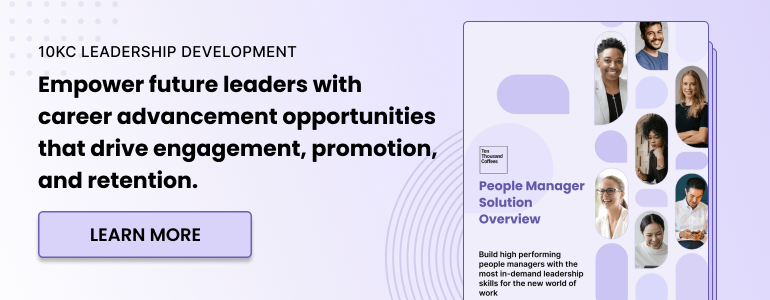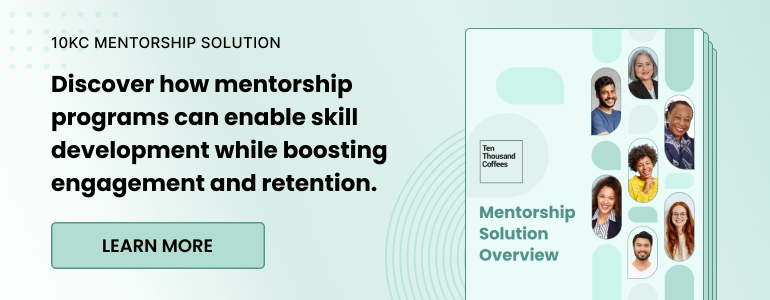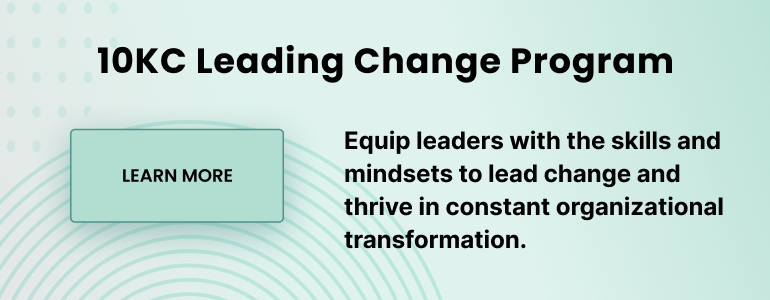In recent years, companies in the U.S. have collectively spent as much as $92.3 billion on formal training opportunities in the workplace. Even just soft skill development is expected to grow to $63.6 billion by 2030.
What’s driving this significant investment in employee training development?
In this guide, we’re taking a deeper look at skill development in the workplace. We’ll explore why enriching employee skill sets has quickly become a priority, examine the latest trends in workforce skill development, and provide some tactical solutions for boosting professional growth within your organization.
What is skill development in the workplace?
Skill development is the process of enhancing employees’ abilities and knowledge to boost performance and achieve your business goals.
There’s no one way to approach skill development in the workplace, but in most situations, it falls into one of three categories:
1. Upskilling: Upskilling is when you level up the existing skills of an employee so they can be better at their current job. This method can also be used to prepare employees for promotions and future roles in the organization.
2. Reskilling: Reskilling is helping employees build a different skill set than the one they have already. This allows them to step into a variation of their current role or a completely new role altogether. Reskilling is commonly used to retain high-performing and high-potential employees when they’ve either expressed interest in a new career path, or their existing role has—or is becoming–obsolete. Reskilling helps you retain top talent, irrespective of their specific job title.
3. Cross-skilling: Cross-skilling is the process of helping employees develop skills in a different area than that of their core job function. For example, an employee in marketing can be cross-skilled in the product development process so that they can better market a product. Cross-skilling helps employees do their jobs better, increases collaboration, and creates interdisciplinary skill sets within the organization.
The need for skill development in 2024
At face value, we often see skill development as something that primarily serves employees. And it does—it provides employees with valuable resources that they need to grow in their careers.
But when we step back, it becomes clear that skill development goes far beyond just individuals or even the organization. It’s a critical response to the evolution of technology and workforce capabilities, ensuring adaptability in a constantly changing landscape.
Thanks to a rapidly shifting economic climate, the disruption caused by the global pandemic, and the rapid rise of AI and technology, the global workforce is facing one of the biggest skill gaps in modern history.
A recent Boston Consulting Group (BCG) survey showed that 72% of HR professionals believe talent gaps are one of the biggest obstacles they’re facing.
This isn’t all that surprising when we look back and consider a 2020 World Economic Forum study that found that half the global labor force would likely need reskilling by 2025. Of course, the talent gap is certainly more prominent in certain industries, such as AI and cybersecurity—which we discuss later on.
But as this overall gap grows, the need to develop employee competencies to meet the demands of the modern workforce becomes more urgent. The current skills gap is predicted to net as much as an $8.5 trillion loss in the U.S. alone, according to PwC. And globally, 85 million jobs could go unfilled by 2030.
For most organizations, skill development in 2024 and beyond will be particularly valuable in order to build a competitive advantage. 68% of hiring managers believe that retraining programs can help prepare the workforce for tech advancements. And another McKinsey report found that skill building (cited by 56% of respondents) is the second most common tactic for addressing skill gaps.
Neglecting to promptly address these gaps can hinder your agility and adaptability in the global landscape, as well as your capacity to meet employee development expectations.
Benefits of skill development for organizations
Of course, addressing the skills gap is only one facet of employee development. Let’s zoom in and look at the ways that investing in skill development can drive returns for organizations.
1. Encourages employee engagement and retention
If we know anything about keeping employees engaged and happy, it’s that we need to give them the tools and resources that they feel make the biggest impact.
Almost all employees (96%) say that developing career-related skills is important to them. And 92% of employees agree that well-planned employee training programs have a positive impact on their engagement.
When organizations don’t prioritize this type of skill development, it leaves employees disengaged and more likely to jump ship to an employer who does provide these opportunities.
2. Creates a culture of growth and learning
The most successful businesses are able to pivot based on changing customer needs. And when development and learning are a part of how you do business, it makes your team more willing and able to adapt to these changes.
Creating a culture of growth and development means that employees are constantly building new skills. And when employee development feels like a priority, employees are more likely to feel fulfilled. It shows them that you value their growth as an employer, which translates into increased job satisfaction and sentiment.
3. Builds your future talent pipeline
A Monster study found that as many as 80% of employers are struggling to fill openings due to skills gaps. With external hiring costing up to 1.7X that of internal talent, it can often be most cost-effective to simply address any missing skills rather than go out searching for the perfect candidate that may not even exist.
Even where organizations have an internal talent pipeline, a succession plan only works if the employees identified have the skills they need to step into future roles when you need them to. Even the highest-performing employees often need some form of upskilling before they’re ready to take on a new, more senior role.
A successful succession strategy works in tandem with an employee development plan to fill current and future gaps in your organization.

4. Boosts employee performance
It’s simple: when employees are better at their existing skills or acquire new ones, they become a bigger asset to your organization. They’re not only more efficient and productive, but they can produce higher-quality work.
And when employee development is driven by the organization, you can easily put a plan in place to encourage skill development in the areas that best fill gaps in your workforce. For example, if you’re in need of talent with people management skills, implementing a people manager development program provides growth opportunities while addressing that gap.
Types of skill development
Whether you’re upskilling, reskilling, or cross-skilling—there are several types of skill development that you can engage in depending on your company’s and your employees’ needs. For the most part, the types of skill development often fall into two categories: power skills (also referred to as soft skills) and hard skills.
Power skills generally are considered to be social and common skills. For example, communication, problem-solving, or even leadership skills. These are often less role-specific and more general skills that are valuable in the workplace.
On the other hand, hard skills are more technical skills that are often specific to a job function. For example, how to program code or financial management.
So let’s look at some common types of skill development that you’ll see in the workplace.
Communication skill development
Communication is probably one of the most important skills to have in the professional world. Whether an employee works from home or in the office, it’s likely that they have to communicate with their peers in one way or another. Knowing how to do so effectively helps employees collaborate better and reduces miscommunications that can create delays or errors in the workplace.
Strong communication between employees also drives connectivity in the workplace. It’s a soft skill that can go a long way in fostering belonging.
Leadership development
Helping employees develop leadership skills is critical for succession planning. While not every employee is going to want to become a manager, every organization needs a steady pipeline of emerging leaders.
Providing high-potential employees with leadership development opportunities also gives those employees a sense of value. It shows them that they’re on the right path to reaching their career goals.

Technical skill development
Technical skill development includes any competencies that give employees special expertise in a particular area. The hard, technical skills that someone needs in their job will likely vary from employee to employee as most roles have slightly different areas of expertise.
However, some technical skills can have broader applications. For example, with the rise of technology, data analysis skills can be beneficial in any role ranging from operation and sales to human resources.
Challenges of skill development at scale
While skill development is an essential piece of any talent management strategy, implementing and facilitating skill development at scale can be challenging. It can be especially complex in larger organizations.
Let’s address some of the biggest challenges that organizations tend to see with skill development initiatives.
1. Managing different skill development needs
Every employee has a different background and different experiences. And of course, within an organization, you’ve got different roles, departments, and years of experience.
This means every employee has very individualized development needs. It’s a bit less of an issue for power skills since every employee can benefit from them. But when it comes to more specific areas of growth, it can be challenging—and costly—to get everyone the resources and opportunities that are best suited to their needs.
2. Providing access to the right resources
60% of employees need upskilling by 2027, but only half have adequate training. Finding and creating opportunities for employees to develop the skills they need is often easier said than done.
For example, mid- to senior-level employees may already hold a certain level of expertise. They often need to learn from someone (or access a resource) that exceeds their current knowledge and capabilities, which can be difficult to find. This is particularly true for unique, technical skills where there’s already a gap within your organization.
3. Measuring impact and tracking progress
When everyone has their own development needs, it’s not just implementation that’s a challenge. It can impact your ability to track progress and measure the return on your investment.
Now multiply that by hundreds or thousands of employees and it can get messy pretty quickly. Without the right tools in place, it leaves many organizations blindly investing in growth initiatives, with little to no understanding of the actual value for both employees and their own bottom line.
.png)
4. Creating equitable opportunities for development
When creating development opportunities for employees, it’s important to also consider your employees’ access to networks, knowledge, and leadership. Race, gender, disability, and other factors can impact who you know, and subsequently, what opportunities are within reach.
This is why companies need to thoughtfully invest in skill development opportunities that are equitable to employees of all backgrounds—not just those that are in proximity to power or those who feel confident enough to ask for it.
Employee skill development activities and tactics
The way in which companies choose to approach employee growth continues to evolve as the needs and expectations of employees change. Here are a handful of different ways you can implement skill development within your organization.
1. 70-20-10 Learning Model
The 70-20-10 Learning Model simplifies how employees learn best. Here's a quick breakdown:
- 70% on-the-job experiences: Most learning happens by actually doing the work. This means being given new work opportunities, tackling real tasks, and making mistakes.
- 20% from others: Whether it's getting advice from a mentor, chatting with coworkers, or collaborating on projects, employees can learn a lot from others. There’s a ton of value in sharing knowledge and experiences.
- 10% formal training: This is the classic classroom learning. Formal training provides the foundational knowledge and skills upon which employees can build through experience and interaction.
This model illustrates that effective learning is a blend of action, collaboration, and study. It underscores the significance of workplace connections in fostering professional growth, while also emphasizing that formal training constitutes just a minor segment of genuine skill acquisition.
2. Training programs
Traditional training is often what comes to mind when we think about skill development. While workshops and formal training programs aren’t—and shouldn’t be—one of the only solutions for learning, there is certainly value in providing training opportunities.
Training programs can come in many different shapes and sizes. They can be shorter workshops or even longer curriculums that provide education over time. Online training courses and e-learning are also training programs that have gained popularity in the digital age.
With that in mind, a Skillshare study of IT professionals found that half of employees (50%) view opportunities for hands-on practice as an important part of a training program. Where possible, you should also be creating hands-on training and learning opportunities that ensure employees are gaining actionable skills.
2. Employee learning stipends
Education opportunities are increasingly becoming part of an employee’s total compensation package.
Instead of—or in addition to—providing structured learning opportunities, companies are opting to provide employees with a set budget that they can use to continue their education in a way that feels valuable to them. For example, most learning stipends allow employees to take external courses or attend conferences.
To avoid wasted resources, these stipends usually come with a requirement that they’re used to enhance an employee’s performance or contributions to the organization. They’re also a great solution to individualizing continued education, without putting the burden of sourcing opportunities on program managers.
3. Mentoring
Corporate mentorship programs help employees learn the way they do best—from other people. Mentoring pairs employees with peers or senior leaders who can help them build new skills and navigate their professional growth.
Mentoring has been long shown to be effective in helping accelerate employee careers. And those results align perfectly with the 70-20-10 framework, which asserts that the vast majority (90%) of learning comes from experiences beyond presentations and workshops.
Mentors can help mentees with skill development by:
- Providing insight into career prospects and opportunities.
- Identifying skill gaps.
- Setting upskilling goals.
- Sharing their own experience and insights.
- Connecting them with resources.
- Creating learning experiences and stretch opportunities.
And the thing about mentoring is it’s not just a one-sided relationship. While mentees can gain valuable insight and opportunities for development, mentors can nurture their own skills. Mentors often become better leaders, better communicators, and can even learn from their mentees. So it’s not surprising that mentors are 6x more likely to be promoted than their non-mentor peers.

4. Peer knowledge sharing
Learning from others doesn’t always have to come in the form of traditional mentorship. Social learning and community-driven career-building opportunities can be equally effective.
Common examples of peer learning can include:
- Group Office Hours: These types of interactive roundtable discussions are an effective way to connect groups of employees with experts and leaders.
- Demo days: Demo days or showcases allow internal teams to share their skills and learnings with the rest of the organization. Not only do they promote knowledge sharing but can increase the visibility of employees within the company
- Internal documentation: When employees document and share the things they’ve learned—whether it’s on the job or through other development opportunities—it promotes knowledge sharing across the company.
5. Individual development plans
Individual development plans are a great way to help employees map out the resources and skill development opportunities that they need to reach their professional goals.
While performance plans can get a bad rap, they shouldn’t be reserved for underperforming employees. Individual plans help make sure employees can see the growth ahead of them and help them get there. It can help mitigate the challenges that come with implementing employee development at scale and put employees back in the driver’s seat of their own learning.
6. Microlearning
Your employees are busy, which means growth and skill development often get put on the back burner. Microlearning delivers education in little, bite-sized pieces to reduce the lift of learning on the employee while boosting engagement. For example, this might include short 3-4 minute videos or short chapters that employees can review regularly.
Over time, this helps employees develop the skills they need without overwhelming them or taking too much time away from their core job responsibilities.
5 important skills to develop company-wide in 2024
Every organization has its own skill gaps and development needs. But there are skills that continue to be in demand and roles that are more challenging to fill. Helping your employees build these competencies can put you one step ahead —regardless of the industry you’re in.
1. AI skills
When generative AI first came onto the scene, it felt new and potentially overwhelming for many employees.
But as AI has become the norm, employees are increasingly eager to find ways to implement AI in their work. The 2024 LinkedIn Workplace Learning report found that 4-in-5 employees want to learn more about how to use AI in their professions. But only, 38% of U.S. executives say they’re currently helping workers become AI-literate.
We know that AI can help employees work more efficiently and streamline their workflows, which means companies that can help their employees leverage AI will quickly gain a competitive advantage.
2. Cybersecurity skills
As more of our lives go digital, cybersecurity is becoming a bigger challenge for companies. The world needs 3.4 million cybersecurity experts (that we don’t have) to support that demand.
Cybersecurity isn’t just a bunch of tech-savvy employees sitting in a room full of computers. Even if you’re not a technology company, cybersecurity is still a critical skill for all employees. Companies need to become more resilient in the digital age. Helping employees become proficient in cybersecurity basics can be the difference-maker when it comes to protecting valuable information and company property.
3. Resilience and adaptability skills
Adaptability and resilience are pivotal in today's fast-evolving business landscape, ensuring organizations can swiftly respond to changes, lead through restructures, and maintain competitiveness.
Adaptability involves embracing new ideas, remaining flexible to change, and innovating beyond traditional methods. Resilience goes beyond recovery from setbacks; it includes growing through adversity and sustaining efforts amidst challenges. This skill is vital for maintaining emotional strength, fostering a positive outlook, and building a culture of support within the organization.

4. Interpersonal and power skills
There’s also a growing power skills gap—particularly among younger and gen Z workers. The conversation behind the cause of this gap is nuanced, but it’s likely a combination of things. For example, the impact of the COVID-19 pandemic and the volatility that we’ve experienced in the workplace over the last few years.
So while 74% of employees say that there are professional development opportunities of some form offered to them, only one in three employees say that their employees offer power skills training.
Power skills are often transferable between different roles, which means you can easily deploy skills development activities to a large group of employees at once. Some examples of in-demand power skills include:
- Emotional awareness: Recognizing your emotions, strengths, and values, and managing your reactions accordingly to navigate interactions more thoughtfully.
- Empathy: Deeply understanding others' emotions from their perspective and responding with genuine care, fostering strong, supportive relationships.
- Effective communication: Practicing active listening and expressing your ideas and feelings clearly, ensuring clear and mutual understanding in conversations.
- Problem-solving and critical thinking: Analyzing situations deeply, thinking outside the box for solutions, and making decisions based on thorough information analysis.
- Teamwork and collaboration: Working harmoniously within diverse teams, valuing different perspectives, contributing to collective efforts, and supporting colleagues.
5. Digital skills
There’s no way around it. Technology is changing faster than ever before. From digital communication to collaboration, digital proficiency is critical to keeping companies connected and working effectively.
A Salesforce study across 19 countries, found that only 25% of workers felt like they were advanced in workplace collaboration technology. Even among Gen Z employees, who grew up surrounded by technology, only 31% feel like they’re prepared to succeed in a digital-first job.
Helping employees of all generations upskill in their digital competencies will prevent a wider digital skills gap and keep your business ahead.
Employee skill development examples: who’s doing it well?
To be frank: skill development is something that the vast majority of companies could be doing better. It’s part of the reason why we’re facing significant talent shortages.
But there are some standout organizations that have implemented programs and unique initiatives that are making an impact.
Promoting internal mobility with Dentsu Aegis
In late 2017, Dentsu Aegis Network found themselves saddled with higher-than-desired employee turnover. A little research showed that employees lacked visibility into career paths within the organization, which left them looking elsewhere for new opportunities.
Dentsu Aegis used mentorship to build employee networks and foster skill development and internal knowledge transfer. At the end of the program, 55% of participants gained confidence in their networking skills and almost half were introduced to a new area of the organization they’d be interested in working in.
"If we can provide employees with an internal knowledge network, they will feel more connected to what's going on in the company.” - John Stockwell, Chief People Officer, Dentsu Aegis Network
Fostering inclusive growth with GE
GE Digital Technology team’s annual employee culture survey showed that employees craved opportunities to grow in their careers. They launched a mentorship program that allowed employees to better connect with one another in a hybrid environment.
With a priority of elevating diverse talent, they were able to create unbiased matches based on employee goals and interests. They were able to curate development curriculums within these connections that helped employees grow and develop skills that supported other key GE initiatives.
They quickly saw attrition rates decrease and when surveyed, employees were able to point to higher rates of career growth.
Amazon’s $1.2 billion upskilling initiative
Employee skill development doesn’t have to be a billion-dollar initiative to be effective. But for Amazon, it was. Back in 2020, Amazon committed to helping over 300,000 employees in the U.S. upskill through free skills-training programs, including college tuition for frontline workers and other digital-first opportunities.
Soft skill training through VR with H&R Block
It’s time to leave stale training videos behind us. In the modern world, there are many better and unique ways to help employees boost their skills. H&R Block leveraged the power of virtual reality to help elevate their customer service team’s power skills at scale, boosting both customer satisfaction and employee retention.
Must-have skill development tools at your company
If you’ve made it this far, you likely know that employee skill development is a massive undertaking. We have some good news for you though: the right tools can make it just a bit easier.
The right skill development tools should:
- Help you implement skill development at scale: There’s no reason you should be manually curating employee growth opportunities. Choose tools that allow you to automatically match employees with the development opportunities that are the right fit.
- Customize to your talent goals: Every employee is unique and so is every organization. The right structured curriculums can help you reach your employee development goals more effectively.
- Make it measurable: Take the guesswork out of measuring impact and ROI. Use data dashboard tools that allow you to measure all your talent experience goals—from employee development program adoption to employee retention.
- Simplify skill development: Overcomplicated skill development solutions can make it difficult for employees to make the most of their growth experience. Tools that integrate with the technology that your employees use every day can make skill development feel like second nature.
A skill development tool that checks all the boxes? 10KC.
10KC’s mentorship and talent development platform has helped 200+ organizations and their employees reach their skill development goals.
%25252520copy.png)


.png)






.png)